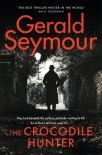The Crocodile Hunter by Gerald Seymour (english novels to improve english txt) 📗

- Author: Gerald Seymour
Book online «The Crocodile Hunter by Gerald Seymour (english novels to improve english txt) 📗». Author Gerald Seymour
When he had almost reached his brothers, Cammy called out, “Don’t look, show no interest. We have to move.”
They went. Did not look at the food and did not drink from the plastic container. Might have gone half a mile. Were tramping on ground that had scant vegetation, no cover, was hard on their feet. Somewhere ahead they would find a place where they could lie up, rest, drink and eat, and then sleep through the heat of the day.
A pick-up came after them . . . To give them a ride, another gesture of hospitality? A moment of extreme danger? Had been too busy telling them to push ahead and make distance, had not shared with them – yet – that he had looked for a moment into the eyes of Abu Bakr al-Baghdadi, had not quipped with them that if they could but find a working phone box and have directory enquiries do the link through to US Central Command in Qatar, and give coordinates and pull in half a squadron of fighter jets and about every drone in the airspace then they could carry off – shared between them – $5 million. Sufficient for a neat little life on an Aegean island or off Australia’s Queensland coast, might even throw in the whole island and . . . the pick-up came after them.
They went across the wilderness of dirt and the pick-up followed them and then accelerated and came alongside. The clatter of the machine-gun mounted on a pole behind the driver’s cab was deafening. Cammy threw himself down. Saw most of his life and Ulrike was across him, and Pieter seemed to stumble and then fell backwards. More bullets were fired and, between those fleeting seconds when his eyes were tight shut, Cammy saw that Pieter’s body was lifted, the proverbial rag doll, and dirt was spat around him. He lay motionless, stifled his own breathing. No sound and no movement from Ulrike. Had that funny fraction of time when he did not know, whether he lived or was dead. One of the guys came down from the pick-up, a pistol in his hand, and walked around them and would have used it if a sign of life had been offered. The plastic bag with the food was picked up, and the water container, and were taken back to the pick-up. It drove away.
Easy to understand. Simpler to have given them rubbish to eat and a minimum of water and let them go in innocence. Easier to kill them all together than when he had approached their hide and the other two had stayed back. He had supposed it a basic attitude of suspicion that would be harboured by any boss-man with $5 million resting on his life or his freedom. He had heaved her off, and she had sworn, rich and German. They were both untouched and Pieter was a colander from the machine-gun bullets.
They had not buried him, had only kicked some dirt on to his face and tried to hide his mouth and the shape of his nose. His saying had been “Never look back. Never chase the past”. From the north-eastern Transvaal. Had a wife there and two small kids in a town called Warmbaths and had told them he was going for a drink in the hotel on the main street, and instead had taken a train to Jo’burg, then a flight out. He might have made an effort to get his hand into Ulrike’s clothes, but not a big effort. He had been a good fighter and an expert sniper, and was used, he said, to dropping a gazelle or an impala at 800 yards. When Cammy had needed advice or wanted to shift the load of responsibility it was to Pieter that he’d turn. They made a poor job of covering him and then hoisted up their rucksacks and left his. Did not even take his wallet. Left the wallet and the photo of the blonde wife and the scrawny kids. Cammy’s fault that Pieter had died because Cammy had locked eyes on the caliphate leader. They had hurried away. Last thing that Cammy had said to the failed grave was, “Yes, Pieter, you have my promise. Don’t know how, when, or where, but my promise is my word.”
He had given her time, had believed she would soften, just a few minutes before she would feel him close to her, then her hand would rest on his shoulder and her fingers would work inside his shirt, and she would touch the scars that had been stitched from the shrapnel and might even find the hole where the Iranian bullet had entered, had burst through tissue and exited, and the dirt had been minimal and the pain excruciating as Ulrike had probed for detritus and . . . She would soften. Her hands were at her sides. He thought she would take him in her arms and their tears would run together.
“I came to see you.”
“Better you hadn’t.”
“I need food, Mum.”
“Then go somewhere you can buy it.”
“I have no money, Mum.”
“Sit on the street and beg for it.”
A sort of wonderment. “No blessing, no food, no money, is that what you have to say to me?”
“You smell.”
“I was in the sea. A boat in the sea and I fell off and . . .”
“You smell of perfume, of scent. Were you screwing someone before you





Comments (0)